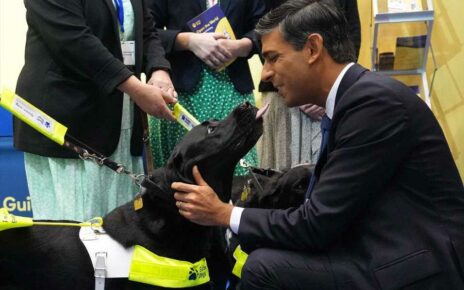Save articles for later
Add articles to your saved list and come back to them any time.
Key points
- Ride-share giant Uber is now listing taxis on its app in Melbourne, Geelong, Ballarat and the Mornington Peninsula.
- The push into the taxi market shows Uber’s increasing dominance in Australia, after recording “collections” of $9.2 billion for the past year.
- Taxis booked through Uber are priced at about 1.2 times the ride-share’s UberX service.
Ride-share giant Uber is listing taxis on its app in Melbourne from Wednesday – a partnership that in the past would have been unthinkable, with both camps bitterly opposed.
When Uber launched in Australia in 2014, taxi drivers went on strike and took to the streets to protest, but Uber is now signing up taxis to its platform for a service rolling out in Melbourne, Geelong, Ballarat and the Mornington Peninsula.
Passengers can book taxis using Uber in Melbourne, Geelong, Ballarat and the Mornington Peninsula.Credit: Simon Schluter
The push into the taxi space shows Uber’s increasing dominance in the Australian market. The company’s most recent filings with the corporate regulator recorded “collections” of $9.2 billion for the past year.
Uber Australia chief executive Dom Taylor said the country had been “a laggard” compared with the rest of the world when it came to offering taxis on the Uber app.
But the taxi industry says the move threatens customer safety.
“If you look around the world, we’ve done deals in both New York and LA,” Taylor said. “In Asia, we have Uber taxi products live in Hong Kong, Korea, Japan [and] Taiwan.”
He said enough taxi drivers had already signed up in Melbourne for Uber to guarantee passengers could get taxis on the app from Wednesday.
“We believe that working together, Uber and taxi can provide a better experience,” Taylor said. “Firstly for consumers in providing them with more choice should they want to move from A to B in a taxi, and then secondly for taxi drivers.”
He said passengers in taxis booked through Uber could use transit lanes such as those on the Tullamarine Freeway, where Ubers are not allowed to go.
And he said Uber’s data from San Francisco showed taxi drivers who used the platform earned on average 23.8 per cent more per month than drivers who did not accept Uber trips.
Uber Australia chief executive Dom Taylor says the tie-up will help users and taxi drivers alike.Credit: Louise Kennerley
“We will be looking at launching Uber taxi products right across Australia,” Taylor said. “Victoria is just the first cab off the rank.”
Taxis booked through Uber are priced at about 1.2 times the ride-share’s UberX service, and Uber takes a 25 per cent fee plus GST.
“It’s clear from the data that working together, we’re better off,” Taylor said.
However, taxi companies are not convinced, with a spokesman for 13Cabs warning the move was a threat to safety and customer care.
“Given that taxi and ride-share vehicles operate on completely different platforms and do not interact with one another, there is no way that either a ride-share or a taxi provider can access the data they need to manage protocols relating to things like fatigue management policies and customer complaints,” he said.
The spokesman said he was confident the majority of 13Cabs drivers would remain committed to the company and would not sign up to Uber. “We have been aware for some time of plans by ride-share operators to try to get taxis onto their platform – and to offload less desirable work to them – while taking a significant cut of the fare for themselves,” he said.
Rod Barton – a taxi operator who formed the Transport Matters Party and was elected to Victoria’s upper house in 2018 but lost his seat in last year’s election – said he had always argued Uber was already a taxi service, rather than an IT company.
“Uber coming into the market will seriously damage the industry and there will be ramifications from that,” he said. “You will have market dominance by a foreign entity, which does not pay tax in this country and does not treat its workers fairly. This is not the final nail in the coffin, but in all seriousness, why would you operate a taxi these days?”
Former taxi driver and Transport Matters MP Rod Barton says Uber has always been a taxi company. Credit: Jason South
Barton said the Australian Competition and Consumer Commission should investigate Uber’s move.
Neil Snipe, professor of planning at University of Queensland, said Uber probably expected to wipe out the taxi industry when it entered the market. That was not successful, so its second tactic was co-operation and partnership.
“Everyone agrees they were mortal enemies 10 years ago and now they are not, and why are they not? It’s all about the money. It’s the financial relationship that has made it good for all parties,” he said.
Snipe said Uber had worked out that by partnering with taxi drivers, the ride-share giant did not have to expand the number of independent contractors it had and would get a cut of all rides sent to the taxi companies.
“In some respects they are providing a one-stop app,” he said. “It kind of follows from what Uber wanted to do from the very beginning. It wanted to be the main provider of transport services, be it vehicles, scooters, cars, trains, the whole thing. It is the whole idea of mobility as a service.”
Snipe pointed to Britain, where Uber has launched a service for booking trains through its platform.
“A few years ago the chief executive of Uber [Dara Khosrowshahi] said he wanted to make Uber the ‘Amazon of transportation’,” Snipe said.
“I don’t think anyone would have predicted the alliance with the taxis, but it is part of their game plan.”
Get the day’s breaking news, entertainment ideas and a long read to enjoy. Sign up to receive our Evening Edition newsletter here.
Most Viewed in National
From our partners
Source: Read Full Article





